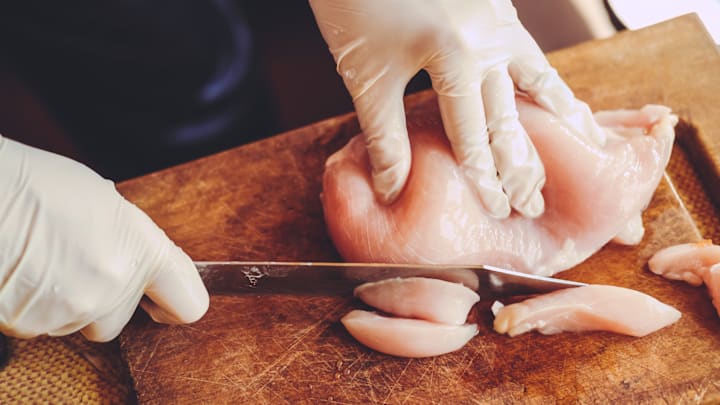When it comes to food safety, it pays to be fastidious. Knowing how to properly handle and prepare meat, fish, and poultry to reduce the risk of foodborne illness is paramount. But one step some people may have picked up from relatives or some misguided advice online actually has the potential to increase your chances of falling ill: rinsing raw chicken. Here’s why it’s a very bad idea.
- Why You Should Never Rinse Raw Chicken
- Why People Rinse Chicken
- Marinating Raw Chicken
- How Long Does Raw Chicken Last in the Fridge?
Why You Should Never Rinse Raw Chicken
Some home chefs (and perhaps some commercial chefs) believe that washing raw chicken can help remove pathogens like Salmonella. While that’s possible, it’s totally unnecessary. Cooking poultry up to a recommended temperature of 165° F will kill off dangerous bacteria regardless.
But it’s not simply a matter of wasted time. According to the U.S. Department of Agriculture, rinsing chicken allows harmful bacteria to spread. A 2019 USDA observational study found that bacteria was present in 60 percent of sinks used to wash poultry; those sinks had lingering bacteria even after being cleaned. Because cooks use sinks to rinse foods like lettuce or other vegetables, there’s a high potential for cross-contamination.
The sink isn’t the only place chickens spread germs. Because water is hitting a hard surface—the uncooked chicken—there’s high potential for contaminated water to splash nearby targets, like clean preparation surfaces, dishes, or uncovered food.
Why People Rinse Chicken
Rinsing chicken has origins in how raw meat was sold decades ago. At the time, it was not uncommon for meat to be stocked without any cleaning, leaving residue or other contaminants that made rinsing a reasonable step. Celebrity chefs like Julia Child helped popularize the practice. But today’s food standards mean chicken is already rinsed and cleaned before being packaged.
If you want to soak up water already collected on raw chicken, you can use disposable paper towels and discard them immediately afterward. Any sponges used to clean where raw poultry has contacted the surface should also be tossed instead of reused. It’s best to rinse any vegetables before handling raw chicken.
Marinating Raw Chicken
While some people opt to use an acidic marinade for raw chicken, be aware that lime, vinegar, and other ingredients only affect flavor—they do nothing to kill or reduce the amount of bacteria present. You should also consider any marinade used as contaminated and discard it as soon as you’re finished with it.
How Long Does Raw Chicken Last in the Fridge?
Sufficient food handling and cooking won’t matter if you’re working with spoiled meat. The USDA recommends that consumers not leave raw chicken in the fridge for longer than two days. Either cook it or freeze it.
Read More Home Tips:
